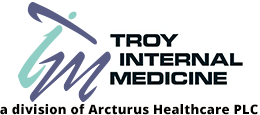SERVICES
Cardiac Testing

About Cardiac Testing
Troy Internal Medicine offers a broad variety of testing procedures designed to quickly and effectively diagnose most cardiac issues. Our team of trained experts will use state of the art equipment and techniques to ensure the best possible diagnosis and treatment.
Vascular and Arterial Doppler Studies
A vascular or arterial Doppler is a noninvasive way for your doctor to evaluate the veins and arteries in your legs, arms, and neck. Blood flow is monitored through the vessels and this can reveal blocked or reduced flow blood that may lead to medical issues such as blood clots (DVT-deep vein thrombosis), or stroke.
What to expect when you have a Doppler
- You will be asked to lie back on an exam table.
- The area of concern will be evaluated with sound waves that produce images of the vessels.
- Gel may be applied to the affected area and an ultrasound transducer will pass over the skin.
No preparation is needed for this test.
ECG/EKG
The EKG is a test often used as part of an assessment of the heart. The pattern recorded on the tracing gives information on the heart rhythm and can be helpful in identifying evidence of a previous heart attack or compromised blood supply to specific areas.
What To Expect When You Get An EKG
- Leads are placed onto the skin of the chest and ankle area with tabs.
No preparation is needed.
Holter Monitor
A Holter monitor is a small wearable device that keeps track of your heart rhythm continuously, typically for 24 hours by means of electrodes attached to the chest. It is about the size of a small camera and is only a minor inconvenience.
2D Echo
A 2-D Echo or cardiac ultrasound is a noninvasive way for your physician to assess the heart and its chamber and valves. This test evaluates heart murmurs, function of the heart valves and motion of the heart muscle.
What to expect when you get a Cardiac Ultrasound (2-D Echo)
- You will be asked to lie down on an exam table
- Gel will be applied to the mid chest area and an ultrasound probe will be guided over the skin surface
- Sound waves are used to produce images of the heart.
This test takes approximately 30 minutes.
No preparation is required.
Cardiac Calcium Scoring
Cardiac Calcium Scoring (CCS) is a quick and noninvasive way to evaluate for the development of blockage, or plague, in the coronary arteries (atherosclerosis). A specialized ultrafast CAT (CT) scan is used to obtain a measurement of the calcium deposited in the artery wall. The amount of calcium detected correlates with the amount of blockage in the arteries. CCS is extremely valuable for detecting early atherosclerosis, which if discovered at an early stage, can help limit the serious complications of coronary artery disease (CAD). Adjustments in a person’s diet, life-style and medications can be guided by the results of this test.
Coronary artery disease is a major cause of death in the United States. Up to one third of all people with CAD have no warning symptoms prior to a heart attack. Traditional cardiac testing methods, such as stress tests, are limited because they detect more advanced blockages and can miss early atherosclerosis.
Who should have this test?
Patients with risk factors of CAD including:
A high level of LDL cholesterol “bad cholesterol”
A low level of HDL cholesterol “good cholesterol”
Hypertension (high blood pressure)
Diabetes
Family history of CAD
Cigarette smoking
Obesity
Physical inactivity
Patients who should not have this test:
Established history of CAD
Age younger than 35 years old (too young to have developed calcium build up)
Age older than 70 (normal calcium build up may interfere with test results)
Presence of fast or irregular heartbeats or arrhythmia
Pregnant or possibly pregnant patients
Preparation for this test is very simple, and involves avoiding food, liquids other than water, and smoking two to three hours before the test. Decongestants should be avoided 12 hours before the test. The tests last only a few minutes. EKG electrodes are placed on the chest, and the patient lies on an examination table. There is no IV or contrast involved.
Prior to having the test, a Patient Data form will need to be filled out. Results will be sent to the physician indicated on the form. If a physician is not indicated one of our physicians will call you to discuss your test results.
Most insurances do not cover the Cardiac Calcium Scoring test and payment is expected prior to the test being done. Cost of the test is $175.00. Should you wish to bring someone with you such as a spouse or sibling cost decreases to $150.00 per person.
YOU NEED NOT BE A PATIENT OF THE OFFICE TO HAVE THIS TEST DONE.









